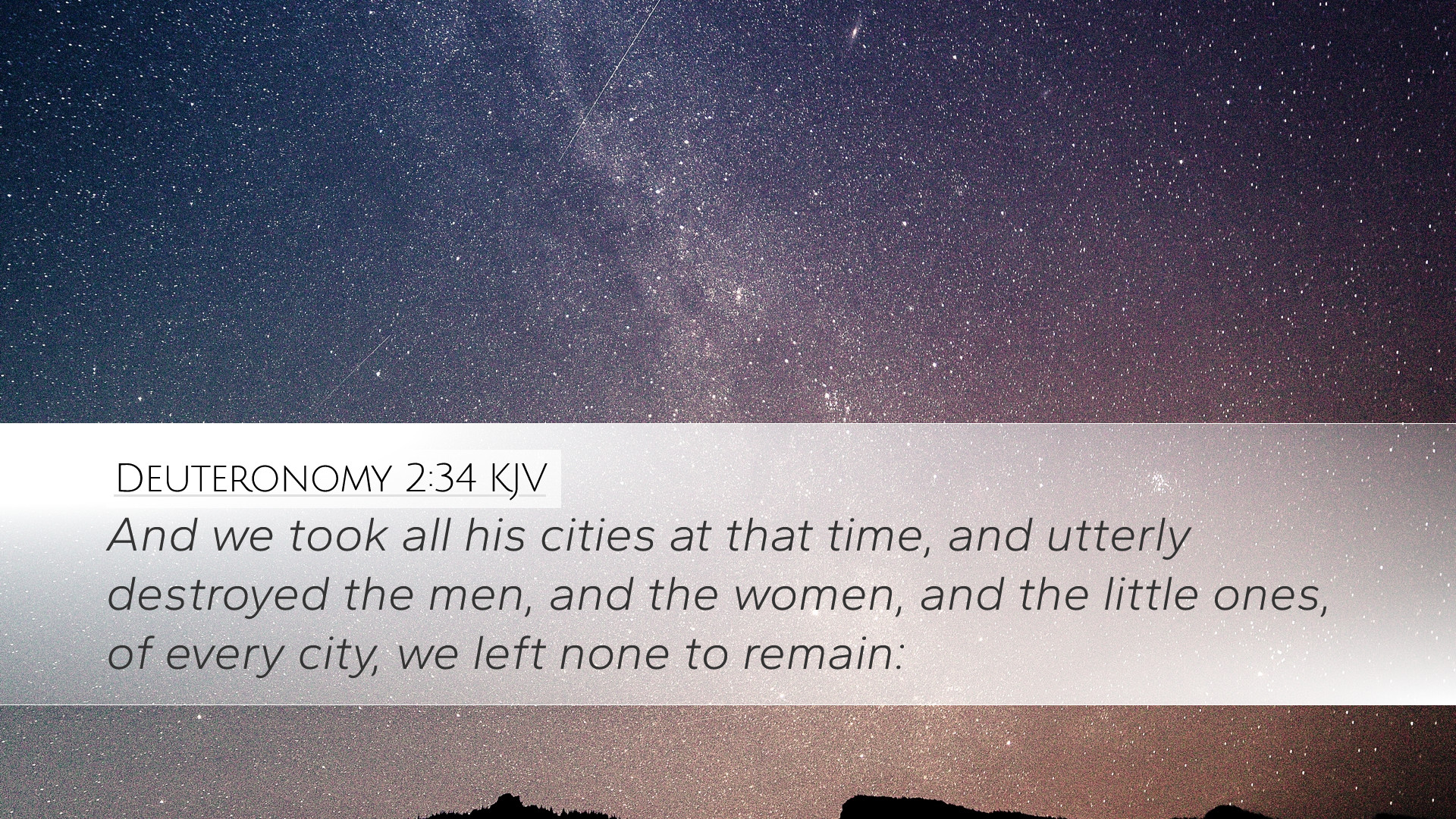Commentary on Deuteronomy 2:34
Verse Context: Deuteronomy 2:34 states: "And we took all his cities at that time, and utterly destroyed the men, the women, and the little ones of every city; we left none to remain." This verse reflects a significant moment in the historical narrative of Israel as they approach the Promised Land.
Overview
This passage presents the culmination of Israel's conquest led by Moses and serves both a historical and theological purpose. It emphasizes the totality of God's judgment against evil, manifesting His sovereignty over the nations, and the diligence expected from His people as they fulfill divine commands.
Historical Context
The narrative appears in the context of Israel's wilderness wanderings, following their exodus from Egypt. During this period, the Israelites are preparing to enter Canaan, and God commands them to exterminate certain nations as a form of judgment for their wickedness and idolatry.
As noted by Matthew Henry, this extreme measure was taken not out of arbitrary cruelty but as a demonstration of divine justice. The Amorites, whose cities were destroyed, had filled their land with iniquity and were under God's wrath.
Theological Significance
This verse invites reflection on several key theological themes:
- Divine Justice: The complete destruction of these cities illustrates how seriously God regards sin. Albert Barnes comments on the necessity of executing divine judgment as a means of eradicating evil from the land.
- Obedience to God's Command: The Israelites' actions were in direct compliance with God's will. Adam Clarke emphasizes that such obedience was crucial for their success in future conquests as they entered Canaan.
- Consequences of Idolatry: This passage contributes to a broader biblical narrative warning against idolatry and the consequences that ensue. The Amorites' fate serves as a sobering reminder of the seriousness with which God views such offenses.
Literary Structure
The structure of the verse is straightforward, presenting a decisive action followed by its consequences. This depiction of event and outcome effectively communicates the severity of Israel’s mandate as they claim their inheritance.
The repetition of "utterly destroyed" reinforces the completeness of the judgment, which serves both as a history lesson and a moral exhortation against partial obedience.
Application for Today
For modern readers, especially pastors and theologians, this passage raises challenging questions regarding judgment, the nature of God, and the call to holiness. Considerations include:
- God’s Character: The character of God as a just and holy ruler is central to understanding this passage. It elicits profound reflection on our perception of God's actions and directives today.
- Appropriateness of Violence in Scripture: This text invites debates about the appropriate application of biblical narratives on violence and judgment in contemporary contexts. It is essential to understand the historical and covenantal context when discussing such themes.
- Leadership and Responsibility: As leaders, believers are called to model obedience to God's commands, just as the Israelites were. This principle of faithful leadership resonates powerfully with those in positions of spiritual guidance.
Conclusion
Deuteronomy 2:34 encapsulates vital lessons on divine justice, the expectations of obedience, and the consequences of idolatry. As the Israelites stand on the brink of entering the Promised Land, they are reminded of their mission's seriousness and the underlying principles that should govern their actions. For theologians and students alike, this verse serves as a testament to the complexity of God's dealings with humanity and the importance of understanding His commands within their historical and covenantal context.


